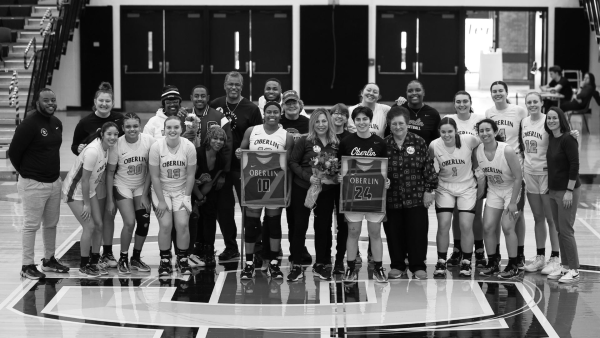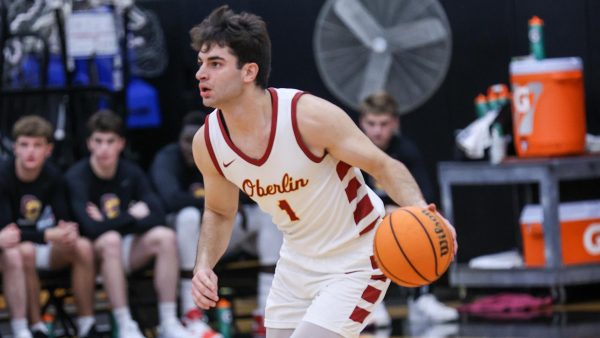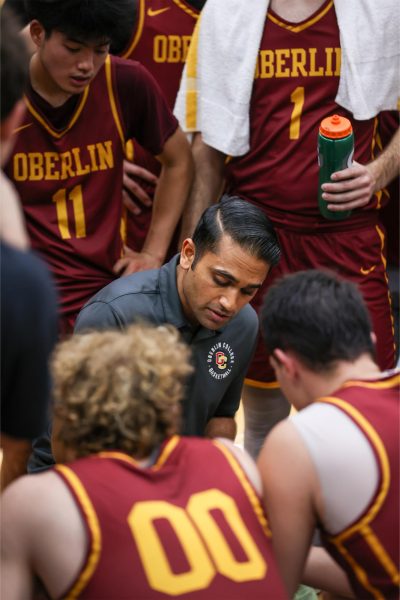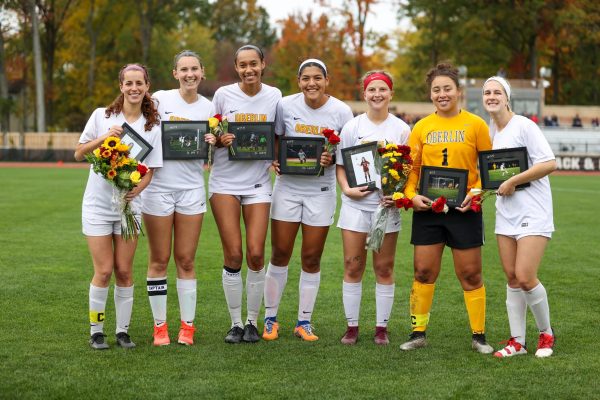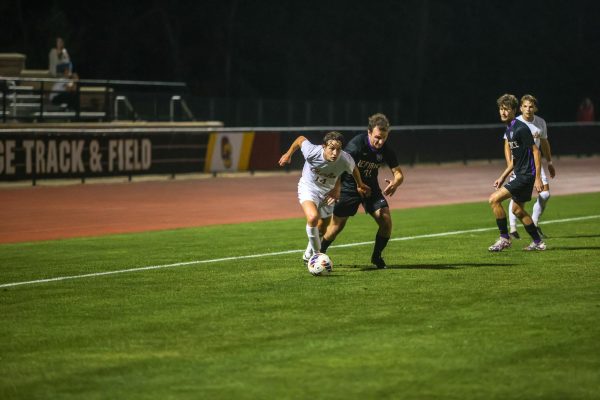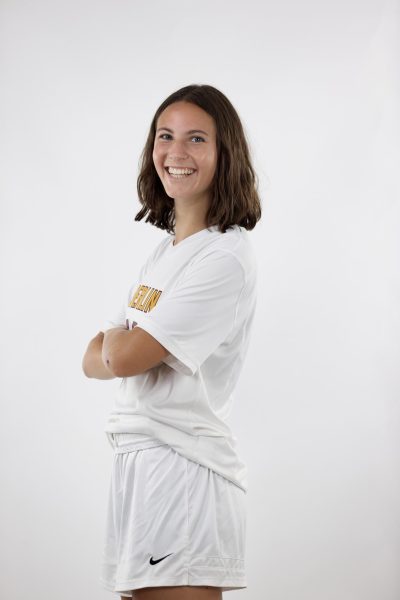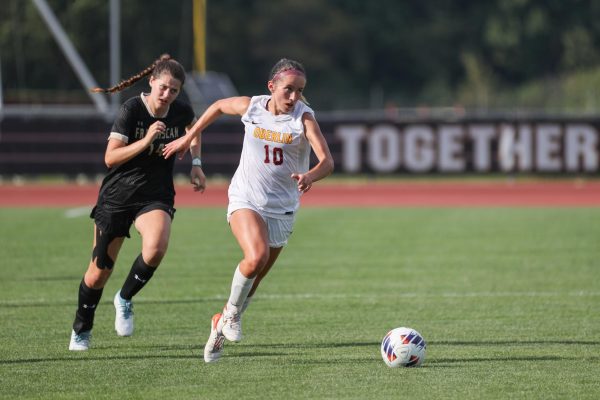Former Varsity Athletes Find That, After Athletics, Life Goes On
Athletics play a significant role in many Obies’ college experience. Roughly 350 students — over ten percent of the student body — are part of the 21 varsity sports teams offered by the College. Club and intramural sports provide a fun way for students to stay active and compete with one another without the time commitment of a varsity sport.
These athletes’ reasons for participating can range from finally trying a sport they have watched for years to the fulfillment of a lifelong dream of participating in college athletics. Most athletes assume that their career will last all four years. However, for many Oberlin athletes, this isn’t the case. Whether it be the result of injuries, or overcommitting themselves, or any other unforeseen circumstances, many Oberlin athletes end up leaving their teams before graduation.
College fourth-year Courtney Kozdron is one of these athletes. A former softball player, Kozdron left the team the summer before her second year. Coming into her first year, Kozdron was working her way back from a thumb injury that required surgery. Over the course of that year, she sustained a concussion, and then injured both her shoulder and her knee — both of which required surgery.
“I went to a geneticist that told me I had hypermobility type Ehlers Danlos Syndrome. Its a ligament condition,” Kozdron said, “The collagen isn’t working properly, so things get too stretched out and can’t heal. So my joints would dislocate and ligaments would stretch out and tear and I needed to get surgery to fix them. And they told me that if I were to continue playing it would just keep happening and would get worse.”
College third-year Kayla Small was part of the dynamic 2017-18 women’s basketball team that captured the school’s first-ever North Coast Athletic Conference Title. Shortly before the 2018-2019 season started, she left the team.
“I remember going to a practice and realizing I just didn’t love the process anymore,” Small said. “I didn’t love preparing for games or competing with teammates or outside competitors. I needed to find and put my time into something I did love.”
College second-year Crystal Gluchowski came into her first year expecting to play for for the women’s soccer team for the entirety of her college years. She appeared in 11 games and was poised to take on a bigger role this year, but left the team before she could assume that role.
“So there’s different reasons,” Gluchowski said, “There’s family reasons … so I have to go home as often as possible. The other one is that Oberlin’s language program isn’t as large as I would like. [Hispanic Studies 440: Music, Orality, and Literature in Hispanic Traditions] meets Tuesdays from 7 p.m. to 9:40 p.m. The team has a lot of games, home and away, on Tuesdays so either I couldn’t take the class or I’d miss a lot of things, which isn’t good. It’s to be expected with a smaller college, where foreign languages aren’t prioritized, because as much as I do love soccer, that isn’t my future.”
Not viewing athletics as a potential career option post-Oberlin is relatable — not only for former athletes, but for current ones as well. The appeal of Division-III athletics, for many people, stems from being able to play the sport they love with people they love. These relationships can make participation in athletics on Oberlin’s campus worthwhile, but can also make it difficult to leave the team.
“My teammates were wonderful,” Small said. “Obviously I don’t spend nearly the same amount of time with them that I did, so it’s only natural some of us grew apart. But I still consider them some of my closest friends and love seeing them when I can.”
While it would be nearly impossible for the relationships that are formed during athletics to completely go away, they do change when an athlete leaves a team, something that Gluchowski has experienced after her decision.
“I definitely feel like [my teammates] understood, but it has been kind of rough because I got [excluded from] social events,” Gluchowski said, “That was a bummer. I did make friends outside of the soccer team my first year, but when you’re with a group of people for such long chunks of time that becomes like your main group. I feel like some of them don’t know how to interact with me anymore.”
Kozdron shared a similar sentiment, mentioning the change that she experienced in her relationships with her former teammates after leaving the team, and her need to build a new community outside of athletics.
“I do still have friendships with people on the team,” she said, “It was a bit of an adjustment at first because my first year was dominated by softball and then I came in my second year not really knowing anybody outside of softball.”
Struggling to find a new community to be a part of is an issue that most athletes don’t anticipate heading into Oberlin. Their team is supposed to be their community.
“My mentality [when it came to picking a college] was that I wanted to go to the best academic school that I could while still playing softball,” Kozdron said.
Since the team is a large part of what they predict their Oberlin experience to be, losing this support system can make many athletes question their place on campus.
“I considered leaving [Oberlin] after I left the team because one of the main reasons I came here was because I could do both pre-med and soccer,” Gluchowski said.
While leaving a team that was supposed to be one of your strongest support groups can be a difficult decision, leaving a sport that you love can be almost impossible. It’s something that many athletes have to continuously deal with.
“I miss softball as a whole on a daily basis, but I can’t really regret quitting something that was going to make me have more surgeries,” Kozdron said. She still tries to make it to at least one softball game a year to support her friends and the team that she used to be a part of.
“I did [regret leaving the soccer team] in the beginning,” Gluchowski said. “I felt like a quitter, ashamed, like, ‘Really, you couldn’t take all of this on?’ There are other people who do this, but, at the end, it was the right decision for me.”
“I don’t regret the decision, and that is how I know I made the right one,” Small said, “[That being said] I often miss basketball. However, everyday I am thankful for what it brought me.”
Kozdron, Gluchowski, and Small all share similar opinions on their decisions now that some time has passed. Seeing the bright side, all three point towards their newfound free time and the ability to explore other academic and extracurricular activities the College has to offer.
“As long as I can still work out and keep up with myself, I feel fine, and I’m kind of happier,” Gluchowski said. “It was a lot of stress and time that I did not have. I was definitely pulling myself into too many places.”
Most student-athletes will go through their four years and fulfill their dreams of being a four-year college athlete. Their careers will end their senior years just as they had always intended. But for others, their career will end prior to that special fourth year. They will, for one reason or another, decide to hang up the cleats sooner than that, and that’s okay.


